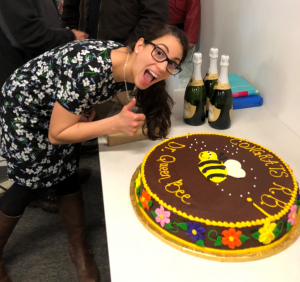 Preparing to defend my thesis was the most mentally, emotionally, and at times, physically, challenging part of graduate school. After my final field season, I thought it was going to be easy. All I have to do is write. I’ve written a ton. Piece of cake.
Preparing to defend my thesis was the most mentally, emotionally, and at times, physically, challenging part of graduate school. After my final field season, I thought it was going to be easy. All I have to do is write. I’ve written a ton. Piece of cake.
I was so wrong.
Yes, as graduate students we write a lot. During my time in graduate school, I wrote scientific papers, grant proposals, popular science articles, blog posts, etc. But I had never written about the same subject so continuously. I started to get sick of my study system (honey bees), which made me sad, because I love honey bees!
When I finally handed my thesis in to my committee, I had to prepare for the actual defense. This was also a challenge. What papers should I read? What is my committee going to ask me? What if they hate my thesis?
In the end, it all worked out. I successfully defended my thesis and the defense was enjoyable! I didn’t need to stress as much as I did.
Preparing to defend your thesis is going to be challenging, but here are some things I realized that may keep you from psyching yourself out too much.
Use a citation manager!
First, a specific piece of advice: start using a citation manager when you get to grad school, keep it updated, and use it consistently! This will make the references section of your thesis much easier to deal with. I didn’t start using a citation manager until year three, and when it came time to write the thesis in year five, I was not happy with past Rachael. I use EndNote but there are many other options and the library hosts workshops on almost all of them.
Keep your committee in the loop.
Throughout your time in graduate school, talk to your committee. Update them on data at committee meetings, discuss methods, ask for suggestions on writing when relevant. If you do this throughout graduate school, your committee won’t be surprised at defense time, and neither will you. If you take the time to get to know your committee members, you may be able to anticipate their questions.
I realize this doesn’t work for that external committee member you may be required to have. When choosing your external committee member, choose someone who knows your field, and read his/her relevant papers. I did this for my external committee member, and I was able to successfully anticipate some of her questions. Also, when it comes to your external member, don’t be afraid to ask around. Ask past graduate students from your lab who they chose and why; ask about their experience in the closed defense.
It doesn’t have to be perfect.
Remember, the written thesis you hand in to your committee is technically a draft. As a perfectionist, this was difficult for me. I was working so hardto make every chapter, every figure, every page, so that it could be publication ready. But with a document that long, it may not be possible in the time you have. And that’s ok. Part of your committee’s job is to suggest edits, which you can then use when/if you publish.
It’s a conversation.
On defense day, I was most worried about the closed defense. What if they hate my research? What if they ask me a question I can’t answer?
Part of these nerves will be alleviated by fostering a relationship with your committee. Also, think of the closed defense as a conversation rather than a “grilling” session. Your committee asks you questions, you answer the questions as best you can. Some questions lead to other questions. It’s just a discussion– a discussion about something you’ve been studying for 4 – 6 years and you know really well.
My closed defense was a fun, productive experience. Sure, I couldn’t answer some of the bigger, theoretical questions, but it was fun to brainstorm and discuss ideas.
Take care of yourself.
Even if you follow all my advice, preparing to defend is going to be difficult. Graduate school is supposed to be hard. Throughout this process (and all of graduate school), remember to take care of yourself.
Countless hours of sitting at a computer takes a toll on your body (this is the physical challenge). Take breaks to stretch or go for a walk. Give your eyes a break from the screen. Drink water. Eat food. (Both sound simple but trust me, you might forget.)
Stay active, whatever that means to you. Do yoga, go for a run, kickbox, get outside, play a board game, grab coffee with friends. And don’t feel guilty about taking time away from school to stay active! Your mental health is important. Your mental health is important. Your mental health is important.
Remember, you are not alone.
Writing a thesis is an inherently isolating process. Don’t let it get to the point where you feel like you’re alone, because you’re not. Talk to past graduate students from your lab (this was my greatest therapy while writing/preparing to defend), attend the graduate writing exchange, visit family, grab coffee with friends (yes, I’m saying it again).
Graduate school takes a village and you have a support system in your mentor, your committee, your friends, your family. Use that support system.
And finally, celebrate!
Following your defense, take time to celebrate your accomplishment! Getting a higher degree takes dedication, ambition, and a lot of hard work. You deserve to be proud of yourself!
Written by Rachael Bonoan, Biology Ph.D. 2018





